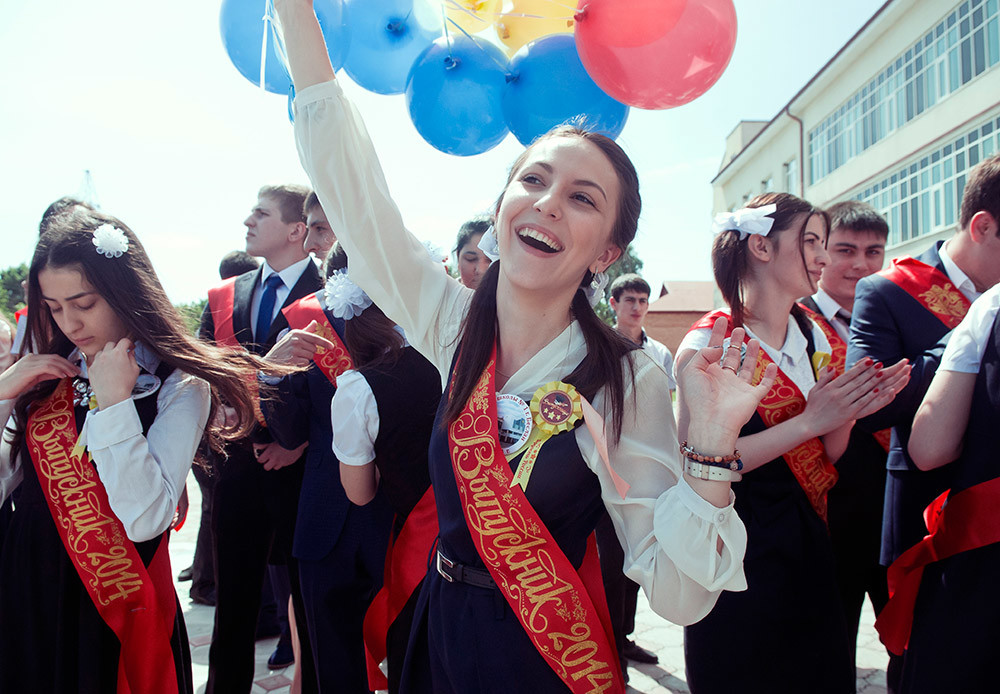The children of Beslan bid farewell to school and their fallen classmates


The children who were held hostage in a Beslan school ten years ago are already graduating from high school. At the end of May, they had their 'Last Bell' at the end of classes like all other high school graduates in Russia.
Oksana Yushko
Hostages were taken at School No. 1 in Beslan, North Ossetia, on the morning of Sept. 1, 2004, during a ceremony held to inaugurate the new academic year.
Oksana Yushko
For two and a half days, the terrorists held more than 1,100 people—including children, their parents and school staff—in a building filled with explosives.
Oksana Yushko
On the third day, there were explosions in the school, and a fire started that caused the building to partially collapse. After the first explosions, the hostages began to run out of the school and security forces stormed the building.
Oksana Yushko
During the chaotic shootout that ensued, in which civilians also participated with their own weapons, 27 terrorists were killed. The only terrorist caught alive was sentenced to life in prison.
Oksana Yushko
The decision was made not to restore the city's destroyed town hall. Most of the students transferred to a new school on Kominterna Street that was built in 2005, practically right across from the old building. This school wasn't given a number in order to avoid recalling the tragic events
Oksana Yushko![“We—our class and others—have seen a lot,” says Amina, smiling. “We took trips to Greece and to America! And we went to Germany and Italy. There were trips to Jordan and to England. And [my friend Fariza] went to school in Moscow."](https://mf.b37mrtl.ru/rbthmedia/images/all/2014/0406/37031/7.jpg)
“We—our class and others—have seen a lot,” says Amina, smiling. “We took trips to Greece and to America! And we went to Germany and Italy. There were trips to Jordan and to England. And [my friend Fariza] went to school in Moscow."
Oksana Yushko
“There are some families where one child was killed and the other survived,” says Fariza, “and they are so fixated on the first that they forget about the second child.”
Oksana Yushko
“People are born good. It's just that some people didn't experience affection in their childhoods; they end up a little tough. Some people were shouted at in their childhoods. I think people do evil either because of their feelings of inadequacy, or to show their importance in some way,” says the graduate.
Oksana Yushko
“The terrorists are not bad,” says Vika. “Back then, a woman told one of the terrorists that they are just children. And he answered that he has children too that died or something. And so he took revenge; he is also suffering, he lost his family.”
Oksana Yushko
“As for the others... I also feel sorry for them, really. Do you know why? Because, I think it's a kind of hypnosis! They were led to believe that they should die in the name of Allah, or whatever they die for, and that they had to sacrifice people. Well, there were probably some bad people who led them... but they didn't do this in order to kill someone: They kill because they believe that, if they do this, they will be fine,” Vika says.
Oksana Yushko
“I don't like to discuss the attack with strangers,” says Vika. “Some people come here to ask about the terrorist attack—many come for that, like journalists. They make reports about the fact that here we are, such heroes, living after the attack. And somehow we are able to find happiness in life. They always talk about the same thing. But anyone would be able to live. Life just goes on and we cannot change what already happened to us. Just the opposite: Now it is more pleasant to look at how we laugh, have fun and enjoy life.”
Oksana Yushko
Eleventh graders laid flowers on the graves of their deceased classmates at the event. They hung ribbons on the monuments saying "Graduate of 2014".
Oksana Yushko
The name Beslan will be forever linked to one of the absolute worst atrocities to ever be committed in human history.
Oksana YushkoAll rights reserved by Rossiyskaya Gazeta.
Subscribe
to our newsletter!
Get the week's best stories straight to your inbox